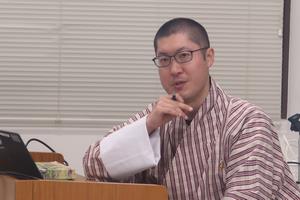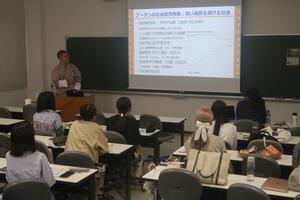- Global Collaboration Center
- Activity
- The report on 32nd SDGs (Sustainable Development Goals) Seminar "Development Challenges in Bhutan and International Cooperation in Japan" (Jul.2023)
ページの本文です。
The report on 32nd SDGs (Sustainable Development Goals) Seminar "Development Challenges in Bhutan and International Cooperation in Japan" (Jul.2023)
2024年8月1日更新
On Wednesday, July 19, from 1:20 p.m. to 2:50 p.m., the 32nd Sustainable Development Goals (SDGs) Seminar was hosted by the Global Collaboration Center. In this seminar, we invited Mr. Suto, a project formulation advisor at JICA Bhutan Office, as a lecturer to deepen our understanding of Bhutan's development by discussing Bhutan's development issues and the current situation of international cooperation in Japan.
First, we learned about the general situation in Bhutan. Bhutan has its own development guidelines known as the Gross National Happiness (GNH) Index, which is also used for policy making and budget allocation. It was mentioned that JICA has been collaborating with the survey since 2015. According to these guidelines, Bhutan has achieved significant development growth in terms of economy, society, and governance.
Second, we learned about Bhutan's development challenges. The results of the GNH survey released in May 2023 showed that there are differences in happiness and growth rates between urban and rural areas, as well as between men and women. In Addition, the outflow of young people abroad seems to be becoming more serious. Under the high youth unemployment rate, it seems that the number of young people who feel insecure and unable to envision a future in life in Bhutan is increasing. Last year (2022), 16,973 people moved abroad, a big blow in Bhutan, which doesn’t have a large population.
Against this backdrop, Japan has established its basic policy of "supporting the development of a self-reliant and sustainable nation with a good balance between rural and urban areas" and is providing various forms of cooperation as the largest partner among the bilateral donor countries of OECD. JICA’s cooperation focuses on the three pillars of agriculture, infrastructure development, and health. Twenty six bridges and the Royal Center for Infectious Diseases to be built in Bhutan are also supported by JICA.
Lastly, he talked about the importance of international cooperation, such as the reason why Japan cooperates with Bhutan. From the explanation of Bhutan's return of kindness at the time of the Great East Japan Earthquake, I learned that "international cooperation is the foundation of friendly relations between nations and peoples," and I realized that the meaning of international cooperation is very simple.
After listening to the lecture, I pondered the development in Bhutan. Although the country is experiencing high economic growth, there are disparities between urban and rural areas and problems with young people going abroad. I learnt that there is a wealth of life and spiritual well-being that cannot be seen from indicators such as GDP and GNH, and I understand the importance of listening to local people’s voice. It was a lecture that made me rethink about what development is in the first place and what kind of cooperation Bhutan will need in the future. We do appreciate Mr. Suto for his contribution.
(Yoshiori Yoshimura, sophomore student, Department of Human and Social Sciences, Faculty of Letters and Education)












